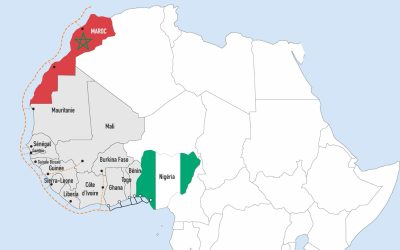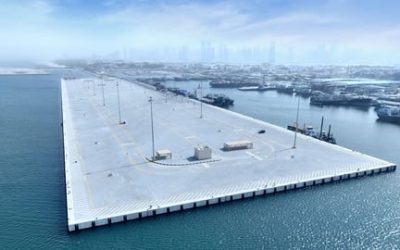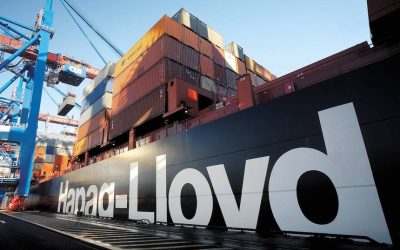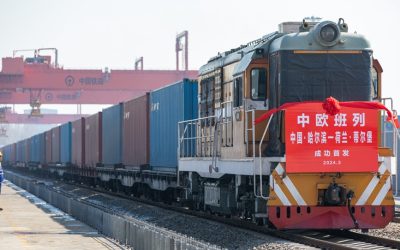The shipping industry, which is highly sensitive to geopolitical tensions, is facing its third point of tension after the pandemic and the war in Ukraine. Energy flows are on the front line. Ports closest to the Gaza Strip are under severe strain. The threat to containers is more diffuse. On the other hand, the proximity of the Suez Canal and the Strait of Hormuz is a cause for concern.
Over the past 36 months, the world has suffered a pandemic that has left an aftertaste in the mouths of certain players in the supply chain, followed by Russia's invasion of the Ukraine, which triggered a rush for gas and a return to coal in certain regions.
The first shock made container ships rich. The second brought back tankers, which had been operating below break-even point since mid-2020.
And now a new front is opening up in the Middle East that could quickly metastasize to consume the entire region if Lebanon's powerful militant group, Hezbollah, reacts, and Tel Aviv strikes at its Iranian enemy, suspected of aiding Hamas and supporting Hezbollah.
Hamas's attack on Israel on Saturday, October 7 took the world by surprise, even though it was only the latest bloody episode in a century of confrontations in the region (to shed light on the complexity and provide keys to understanding, there's nothing like maps, see this article from Le Monde).
The Palestinian Ministry of Health reported the deaths of 2,215 people, mainly in the Gaza Strip, a coastal strip 40 km long and 10 km wide, which has seen so much coveting and forced so many exoduses. The Israeli authorities are also counting their dead in the thousands, more than 1,600 in just a few days of conflict.
"Geopolitical conflicts and global health crises, regrettable as they are, often have unexpected consequences, boosting profits in specific sectors. Wars tend to inflate the profits of defense companies, while the pandemic has led to substantial gains for some pharmaceutical companies.
The maritime sector is no exception to this dynamic, with shipowners deriving unexpected benefits from both types of crisis," points out Christian Roeloffs, CEO of Container xChange, exonerating himself from discussing the profit and loss of an industry in such circumstances.
Energy flows on the front line
Hypersensitive yet resilient in the face of geopolitical tensions, shipping will now have to deal with a third point of tension, the sensitive effects of which mainly concern energy flows. Their gradual recovery since June was already mowed down by fears about the health of the global economy.
Moreover, the dispute arises against a backdrop in which Saudi Arabia and Russia, the largest OPEC+ producers, continue to lock in their supply until December to support world prices.
Ports put to the test
A deepwater port built on the open sea, Ashdod is one of Israel's three main cargo ports, alongside Haifa and Eilat.
Situated 50 km from the Gaza border, Ashdod is, along with Ashkelon, 15 km from the Gaza border, particularly exposed to missile attacks. The Ashdod oil port is closed in principle, but permission to dock or unload cargo moored at the port's anchorage may be granted on a case-by-case basis.
"Ships can only unload their cargo when they are moored to buoys, which gives an indication of the level of risk," explains Christian Roeloffs.
Adani Ports, the port's Indian operator, is referring to a business continuity plan, which makes the situation confusing.
Ashdod, for its part, applies strict entry procedures for vessels carrying hazardous materials ("Hazmat"), according to Hapag-Lloyd.
"At present, port operations in the main Israeli terminals continue to function normally, and we do not anticipate any substantial impact on our main hubs in Ashdod and Haifa," Maersk said in a statement to its customers.
The Danish container ship owner, with offices in Tel Aviv and Haifa, also indicated that container bookings to and from the country were still possible, and that domestic road and rail services were operational. Only air freight was affected by the cancellation of several flights by airlines.
The carrier had reacted just as swiftly to Russian aggression in the Black Sea, before deciding, like most of its peers, to desert the field. MSC echoed this sentiment, repeating that Israel's main terminals were all operational.
Only Haifa-based ZIM has introduced a war tax on travel to and from Israel, while also stressing that it is maintaining its operations "without significant disruption on routes to and from Israel".
At present, despite the war situation in Israel, all local ports in Ashdod, Haifa and Eilat are operating normally. Service interruptions may occur, however, in the short term, due to security directives imposed by the Israeli authorities".
The strategic fleet, which France is beginning to think about, is a reality in Israel. Apart from its reservist employees, ZIM can have part of its capacity mobilized for emergency or national security purposes by the Israeli government ("special state share").
Region already classified as high-risk
The war situation in the country has prompted insurance companies to impose a war premium on all ships calling at Israeli ports, justified the Israeli shipping company in a note to its customers.
Before the attacks, Israel was already among the Middle Eastern countries considered by the Joint War Committee (JWC) to be among the high-risk zones, which designate those threatened by war, piracy, terrorism and related risks.
This means that ship operators have to pay a surcharge for seven-day voyages to Israel. Since the upsurge in tensions, these have risen tenfold to around 0.15-0.2% of a ship's value, translating into tens of thousands of dollars in additional costs. By comparison, the premium was 0.0125% at the beginning of the year, according to insurance sources.
"Israeli ports are considered to present a heightened risk," says Dryad Global, a British company specializing in maritime risk consultancy and security.
"If ports are operational, their situation can change rapidly," warns Gard, the largest protection and indemnity (P&I) insurer among the 12 members of the International Group of P&I Clubs.
"The situation in Israel remains precarious, and we recommend that ship operators and their captains visiting Israeli ports frequently check local sources of information, e.g. shipping agents, local authorities and/or Gard's correspondent, for the latest safety information, carefully assess all calls on a case-by-case basis, and revise their contingency plans accordingly. We also recommend consulting the ship's war risk insurer well in advance of arrival at any Israeli port".
Limited threat to containers
"The threat of disruption to container flows in the Mediterranean region remains limited," says Christian Roeloffs, whose Hamburg-based software company is renowned for its container inventory management tool.
Israel is in fact a small market for container shipping, with Ashdod and Haifa accounting for just 0.4% of the global volume handled.
Operated by Ashdod Port Company, a government-owned enterprise 100% owned by the State of Israel, Ashdod handles a container volume (1.43 MEVP in 2022, -11%) more or less similar to Haifa (1.5 MEVP, +4% in 2022 vs. 2021).
Trade dominated by high-tech products
Israel is renowned for its high-tech products, of which several major countries are major importers. The United States bought $18.67 billion worth of goods from Israel in 2022, including high-tech and military equipment, ahead of China, whose imports totaled $4.68 billion, and India, which contributed $3.94 billion to Israel's foreign trade coffers.
In Europe, Germany has the strongest ties with the Middle Eastern country, with trade estimated at $1.88 billion.
What are the geopolitical consequences?
International observers all have in mind the Abraham Accords, concluded in 2020 under the aegis of the United States, which re-established relations with riparian countries such as the United Arab Emirates and Bahrain.
They have had the effect of easing certain tensions in the Middle East and bringing foreign investment back to the region, particularly in the upstream energy sector (exploitation of large natural gas deposits), they argue.
The attacks are seen by some as an attempt to destabilize the process of normalizing diplomatic relations between Saudi Crown Prince Mohammed bin Salman and Israeli Prime Minister Benjamin Netanyahu.
Major infrastructure projects thwarted
Current regional complexities complicate some major projects. Israel is a key point in the India-Middle East-Europe (Imec) economic corridor, positioned as the western counterpart to China's Belt and Road.
On the sidelines of the G20 summit in New Delhi last October, the USA, India, Saudi Arabia and the EU signed a memorandum of understanding to implement an economic corridor linking Middle Eastern countries by rail and connecting them to India by port, to facilitate the flow of energy and trade from the Gulf to Europe, while reducing transport times, costs and fuel consumption.
The project is still unclear at this stage, due to a lack of technical details, cost estimates and financing arrangements. Imec is to comprise two distinct corridors: an eastern one linking India to the Persian Gulf, and a northern equivalent between the Middle East and Europe.
At the time, Jon Finer, Deputy National Security Advisor for the United States, assured us that this move was part of the United States' efforts to "lower the temperature in the region" and "resolve a conflict where we see it".
But in terms of infrastructure, it's the Suez Canal that's particularly worrying, as the main route for goods from Asia to Europe. Similarly, the Strait of Hormuz, the backbone of oil and gas transport, could be disrupted should the conflict escalate and become bogged down. Analysts fear a further spike in freight rates as a result of higher insurance premiums.
Gas exports under threat
Israel, which exports gas to Egypt and Jordan (+29% in 2022, 9.2 billion m3), has become a major gas producer in recent years (21.9 billion m3 in 2022 and 12, 3 billion in the first half of 2023 according to official data) thanks to the Tamar field (operational since 2013, 11.4 billion m3 in 2022), the Leviathan field (commissioned in 2019, 10.2 billion m3) and the Karish field (opened in October 2022, 1.97 billion m3 in the first half of this year).
US major Chevron, which operates the Tamar gas platform off the port of Ashdod, in which it holds a 25% stake, has been ordered by the Israeli Ministry of Energy to suspend its operations there.
The American group's other major platform in the region, on the Leviathan field, is not affected for the time being. The site is less close to Gaza, closer to the port of Haifa.
This is not a first for Chevron. In May 2021, the company was also forced by the authorities to suspend operations for several days after rockets were fired at Israeli towns from the Gaza Strip.
In May 2019, Israel had also decided to cut off gas supplies to the platform after an upsurge in cross-border fighting between Palestinian militants and Israeli forces, which lasted three days.
The loss of Israeli gas imports from Chevron's Tamar platform will primarily affect Egypt's ability to export LNG, argued International Energy Agency (IEA) gas analyst Gergely Molnar at the IEA's medium-term gas market outlook.
Egypt imports Israeli gas from the Tamar and Leviathan fields to meet domestic demand and for LNG exports from its two liquefaction plants: Idku, operated by Shell (capacity 7.2 Mt per year) and Damietta, operated by Eni (5 Mt).
Both facilities are considered essential for supplying Europe with LNG. In June 2022, the European Commission, Israel and Egypt signed a trilateral Memorandum of Understanding on the supply of Israeli gas to the EU via Egypt's LNG export infrastructure.
Marginal impact on prices for now
For the time being, the impact on gas prices in Europe is marginal, said Goldman Sachs. However, they rose worldwide at the start of the week just after the attack, with the new hotbed of tension in the Middle East coming on top of the strike by LNG export plant workers in Australia.
"The mild weather offset the scale of this potential disruption to LNG supply," added the investment bank.
The movement of the curve, with TTFs (Title Transfer Facility, gas trading benchmark) up 8% for winter 2023-2024 and 6% for summer 2024, to €47 per megawatt-hour, is so far justified, sweeps Goldman.
However, the uncertainty surrounding the duration of the interruption in gas production and the risk of escalation in the region are likely to influence prices, warns the investment bank.
Adeline Descamps
Journal de la Marine Marchande



















0 Comments